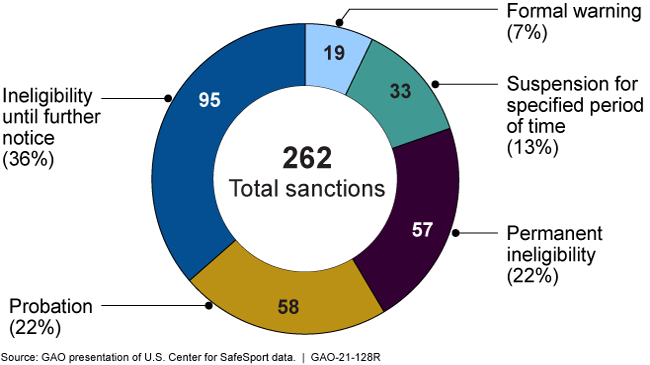Amateur Athletes: The U.S. Center for SafeSport's Response and Resolution Process for Reporting Abuse
Fast Facts
The U.S. Center for SafeSport is responsible for protecting amateur athletes from emotional, physical, and sexual misconduct and abuse in the U.S. Olympic and Paralympic communities.
The Center refers to an initial allegation of misconduct as a "case" when it has enough information to start investigating. From July 1, 2019-June 30, 2020, the Center resolved 2,460 cases and imposed sanctions in 262 of them. There were 57 cases in which permanent ineligibility was the most serious sanction imposed, and 95 cases in which "ineligibility until further notice" was the most serious. The Center referred 424 reports of alleged abuse to law enforcement.
Number of Sanctions for Cases Resolved, July 1, 2019 - June 30, 2020

Highlights
What GAO Found
The U.S. Center for SafeSport (the Center), an independent nonprofit organization, was established in response to concerns about the consistency of investigations conducted and resolutions reached by amateur sports organizations of allegations of misconduct and abuse. According to Center staff, their response to allegations of misconduct are guided by the SafeSport Code, which establishes acceptable standards of conduct for all individuals who participate in U.S. Olympic and Paralympic events and training, Standard Operating Procedures (SOPs), and other tools.
The SafeSport Code defines the scope of the Center's jurisdiction, establishes the standard of proof for its decisions, identifies types of prohibited conduct, describes possible temporary measures and sanctions, and outlines the resolution process and requirements to report to law enforcement. SOPs outline intake and investigation staff roles and responsibilities and provide a step-by-step guide of processes, and a case management system is used by intake and investigation staff to document their work. The Center seeks to ensure its intake and investigation process is fair by taking steps to ensure anonymity and privacy; providing opportunities for claimants (the persons alleged to have experienced misconduct) and respondents (the individuals accused of misconduct) to participate in investigations; and providing parties with the right to consult with an advisor and to seek arbitration of sanctions or other measures imposed by the Center.
The Center refers to allegations of misconduct as cases when it establishes that it has enough information to proceed with intake and investigation. From February 2018 through June 2020, the Center created and resolved 3,909 cases. Most of the Center’s cases were resolved through administrative closure or jurisdictional closure. Administrative closure may occur as a result of insufficient evidence, claimants who elect not to participate in the resolution process, or other factors. Jurisdictional closure occurs when the Center does not have jurisdiction or the Center chooses not to exercise its discretionary jurisdiction, as defined in the SafeSport Code. As of June 30, 2020, approximately 1,300 individuals were listed in the Center’s Centralized Disciplinary Database; this number includes individuals placed on temporary restriction(s) or temporary suspension, as well as individuals suspended or rendered permanently ineligible to participate.
Why GAO Did This Study
On February 14, 2018, the Protecting Young Victims from Sexual Abuse and Safe Sport Authorization Act of 2017 was enacted, which codified the Center’s jurisdiction over the U.S. Olympic and Paralympic Committee and its affiliated organizations with regard to safeguarding amateur athletes against abuse in sports. It also required the Center to develop resources and policies to prevent abuse of amateur athletes. The Center investigates and resolves allegations of sexual misconduct by coaches, trainers, managers, peers, and others that may be in violation of the Center’s policies and procedures. In addition, the Center may, at its discretion, investigate and resolve allegations of other policy violations, including non-sexual child abuse and emotional and physical misconduct. The Center plays a key role in ensuring the safety of amateur athletes, many of whom are minors, who participate in Olympic, Paralympic, and Pan-American events and training.
GAO was asked to describe the process the Center uses in responding to, investigating, and resolving allegations of misconduct. This report describes (1) how the Center responds to allegations of misconduct in amateur athletics and seeks to ensure its process for investigating and resolving allegations is fair, and (2) what is known about incidents reported to the Center from February 2018 through June 2020. GAO reviewed documents relevant to Center intake and investigation policies and practices and interviewed the Center's leadership, including individuals responsible for the intake and investigation of allegations of misconduct. In addition, GAO requested summary data for the period February 2018 through June 2020—the most recent data available—including information about allegations of misconduct and abuse, and the investigation and resolution of cases.
For more information, contact Kathy A. Larin at (202) 512-7215 or larink@gao.gov.
